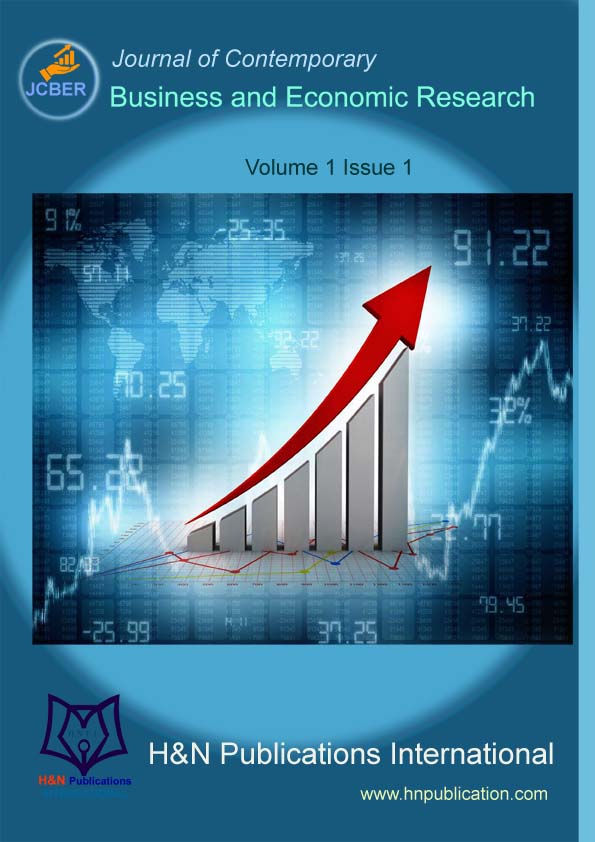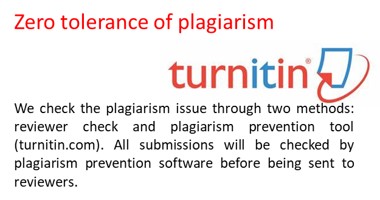- Home
- About Journal
- Editorial Board
- Author
- Archive
- Submission
-
Advanced Search


Authors' Instruction
Journal of Contemporary Business and Economic Research (JCBER) accepts manuscripts (Original research, review articles and Short communication) on original work, either experimental or theoretical from various disciplines. All manuscripts are subjected to RAPID peer review process and published within 3 to 4 days after final acceptance. Manuscripts those are original work of author(s) (which are not previously published and are not under consideration for publication by another journal) and having high quality would be published without any delay in subsequent issue.
Manuscript categories
Journal of Contemporary Business and Economic Research (JCBER) accepts four types of manuscripts (i) Full length research articles, (ii) Short communications, (iii) Review articles, and (iv) Case studies etc.
Full length research articles should not generally exceed 25 double-spaced pages (<5000 words) of text (not including the references) and should not contain more than 15 figures and/or tables.
Short communications should not exceed 10 double-spaced pages of text (not including the references) and no more than 5 figures and/or tables.
Reviews should not generally exceed 20 double-spaced pages of text (not including the references) and should not contain more than 10 figures and/or tables.
Case studies should not exceed 10 double-spaced pages of text (not including the references) and no more than 5 figures and/or tables.
Manuscript preparation for Full length research articles
Manuscript format
Title section: Title of the manuscript should be clear, concise and informative. Title should be typed in sentence case and should have maximum 150 characters. Provide the name(s) of authors as First Name (Given name)-Middle Name- Last name (Family name/Surname) for each author and check that all names are accurately spelled.
1st author, 2nd author, 3rd author…
1. 1st author’s affiliation, address
2. 2nd author’s affiliation, address
3. 3rd author’s affiliation, address
Corresponding email: (corresponding author’s email)
1. Abstract: The abstract is a brief and comprehensive summary of the paper in one paragraph. It should be 150-250 words. The abstract should not contain any undefined abbreviations and citations. The abstract should be written in one paragraph only and the first sentence is not indented.
Please use 12-point Times New Roman font with 1” margin in all sides. The right margins should be justified.
Keywords: There shall be 5 keywords arranged alphabetically which can be used for indexing purposes.
2. Introduction: This section lays the groundwork for why the paper is important. The part includes the context or background of the study that provides a brief and balanced review of the pertinent published literatures on the subject of interest. This section summarizes current understanding of the problem investigated, discusses the significance of the study, the purpose or objectives of the study, rationale and approach.
Please use 12-point Times New Roman font with 1” margin in all sides. The right margins should be justified.
3. Materials and Methods: This section provides the procedures used in the research study or the experiment by which a study’s validity is judged. This section includes the description of the study sites and the precise locations (latitude, longitude, maps - for field/ecological studies), participants / subjects, research design, procedures for collecting data and the qualitative analyses and / or statistical procedures.
Please use 12-point Times New Roman font with 1” margin in all sides. The right margins should be justified.
4.Results and Discussion: This section objectively presents the key results with corresponding discussion, analysis or interpretation, in an orderly and logical sequence using both text and illustrative materials (Tables and Figures). The results section always begins with text, reporting the key results and referring to figures and tables as one proceeds.
Please use 12-point Times New Roman font with 1” margin in all sides. The right margins should be justified.
Captions for Tables and Figures should be Times New Roman 11-point bold. They should be numbered (e.g., “Table 1” or “Figure 1”), please note that the word for Table and Figure are spelled out. Figure’s captions should be written beneath the image or picture, and Table captions should be written above the table body. The heading of subsections should be in Times New Roman 12-point bold, italicized with only the initial letters capitalized.
5. Conclusion and Recommendations: Please use a 12-point Times New Roman font with 1” margin in all sides. The right margins should be justified. Conclusions and recommendations should be in paragraph form and should not be numbered. 3
6. Acknowledgment: This section recognizes the people who have helped for the completion of the study and what they did. The substantial sources of funding for the research or project should be acknowledged in this section. Please use the 11-point Times New Roman font with 1” margin in all sides. The right margins should be justified.
7. Conflict of interest: There is no conflict of interest among the authors.
8. References Style: All manuscripts should be formatted using the American Psychological Association (APA) citation style. For additional examples, consult the most recent edition of the Publication Manual of the American Psychological Association.
For detail please download: APA Style
Citation of Books
Author’s surname Initial(s) of the given name(s). (Year of Publication) Title of Book, Volume number (if relevant), edition (if relevant). Publisher, Place of Publication
1. Pett, M. A. (1997). Nonparametric statistics for health care research: Statistics for small samples and unusual London: SAGE Publication.
Citation of Articles
Author’s surname Initial(s) of the given name(s). (Year of publication) Title of article. Journal, Volume number (and issue number if issues within a volume number are not consecutively paginated): Number of first and last page of article
2. David, D. F., Loard, Q. T., & Marget, K. N. (2011). Title of the article, Anthropologist, 23(3), 215-226.
Citation of Websites
Author’s surname Initial(s) of the given name(s). (if known) the title, type of document (if relevant), date of issue (if available), web address and date of access, if the document or the website may be subject to change.
3. European Commission, (2001). Risk Management Tools for EU Agriculture with a Special Focus on Insurance. European Commission working document, 2001. http://ec.europa.eu/ agriculture/publi/insurance/ text_en.pdf. (Accessed on 06 June, 2015)
Plagiarism checking
Articles should be submitted after ensuring that there is no plagiarism. Before seniding to the reviewer we check by plagiarism checking softawre.

Review Process

All manuscripts submitted will be primarily screened, evaluated, and later peer-reviewed by two anonymous experts. The corresponding author will be communicated through email to notify the receipt of manuscript and editorial decisions regarding the acceptance or rejection of manuscript.
Proofs and reprints
After acceptance of manuscript for publication electronic proofs will be sent (e-mail attachment) to the corresponding author as a PDF file. Page proofs are considered to be the final version of the manuscript. With the exception of typographical or minor clerical errors, no major changes will be made in the manuscript at the proof stage. Because Journal of Contemporary Business and Economic Research (JCBER) will be published online, authors will have free electronic access to the full text (PDF) of the article. Authors can freely download the PDF file from which they can print unlimited copies of their articles.
